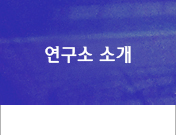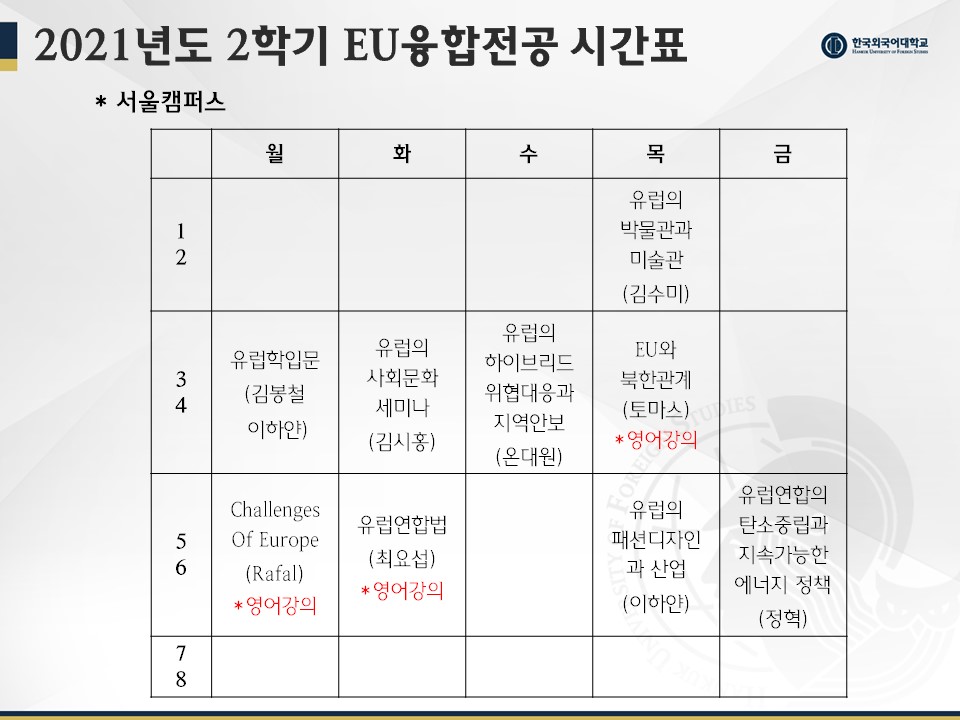
설립취지
1999년부터는 서유럽연구소를 ‘EU연구소’로 개칭하고, 연구소 발행 학술지의 명칭도 ‘서유럽연구’에서 ‘EU연구’로 변경하였다. EU연구소로 개칭하면서 그간 지역학과 어문학을 망라했던 연구소의 연구영역은 점차 지역학 중심으로 변모하였으며, 현재는 EU와 그 개별 회원국 및 관련 지역의 정치, 경제, 사회, 문화 등을 연구영역으로 하는 명실상부한 유럽 관련 지역학 전문 연구기관의 위상을 확립하게 되었다. 현재 EU연구소는 유럽의 연구지원 전문기관인 EURAXESS의 한국지부를 유치하여 EURAXESS KOREA와 함께 한국에서 유럽연구를 위한 지원을 확대하고 있다.
EU연구소는 타의 추종을 불허하는 연구기반 및 연구역량을 보유하고 있다. 연구소는 1996년 한국에서 EU로부터 공식문서를 받는 유럽연합자료실(European Documentation Centre: EDC)을 유치하여 정보서비스를 제공하고 있으며, 2010년에는 EU로부터 자금을 지원받아 현대경제연구원(Hyundai Research Institute: HRI)과 함께 유럽통합 연구 및 네트워크 기관인 유럽연합센터(EU Centre)를 운영하였다. 연구소는 현재까지 수많은 국내외 기관과 네트워크를 형성해 공동연구를 수행하고 있으며, 특히 국내 유럽 전문 연구단체 및 전 유럽 전역의 대학과 학술교류 및 협력협정을 체결하고 있는 동시에, 한국교류재단(Korea Foundation) 등의 지원으로 유럽에서 한국을 방문하는 Visiting Scholar를 유치하는 등 안정적인 연구기반을 가지고 있다. 이와 함께 본 연구소는 삼성그룹 등 주요 기업체의 유럽전문가 양성 교육에 프로그램을 제공함으로써 학술연구의 사회적 환원에 이바지하고 있다.
EU연구소는 학술지 발간, 콜로키움 및 각종 학술행사를 통해 유럽연구를 선도하고 있다. 또한 연구소는 학내에 전 유럽을 포괄하는 다양한 유럽 관련 강좌를 개설하여 운영 중에 있다. 구체적으로 본 연구소는 ‘EU융합전공’ 과정을 운영해 매년 수십 명의 학문후속세대를 육성하고 있으며, 나아가 교내 국제지역대학원의 EU학과와 연계하여 유럽통합과 관련된 강의를 제공하여 교육과 연구를 겸비한 국내 최고의 유럽 전문 연구기관으로서의 위상을 강화하고 있다. 특히 유럽의 많은 연구기관들과 폭넓은 네트워크를 통하여 유럽과 EU에 관한 각종 국제학술대회를 다수 개최하고, 한국유럽학회 등 관련 학회와 한국연구재단, 외교부 등의 연구를 공동으로 수행하는 등의 학문적 성과를 내고 있다.
향후 본 연구소는 인적 자원을 재정비하고 보다 체계적인 연구계획을 모색하여 기업연수, 정보수집, 중소기업육성을 위한 기반산업서비스에 주력할 예정이다. 연구분야도 사회과학분야와 함께 문화, 예술, 공학, 기술, 환경, 언어 등 다양하게 확대하고, 외국 연구기관과의 협력 하에 유럽에서의 한국학 연구에 대한 협력을 계획하고 있으며, 인적 교류에도 주력할 것이다.
Purpose of establishment
The origins of the Institute of EU Studies can be traced back to the joint history of the 'German Research Institute' and the 'French Research Institute' established in the 1960s. On March 9, 1993, the two research institutes created a new era in the name of the 'Western European Research Institute' for in-depth understanding and research on the change and meaning of Europe, which was on its way to consolidation. Until the establishment of today's Institute of EU Studies in 1999, it was the only channel for European research in Korea in which active research activities were carried out. However, as a result of European consolidation and its development, the number of member states that have joined the European Union has increased. Accordingly, a more in-depth and comprehensive approach became inevitable due to the expansion of the research area. Therefore, in 1999, the Western European Research Institute was renamed ‘Institute of EU Studies’ and the name of the journal published by the research institute was changed from Western European Research to EU Research. As the research institute was renamed Institute of EU Studies, the research area of the institute, which had been covering regional studies, language, and literature, gradually transformed to focus on regional studies. At present, it has established its status as a research institute specializing in regional studies related to Europe, covering a research area that focuses on the politics, economy, society, and culture of the EU as well as its individual member states and related regions.
The Institute of EU Studies has a superior research base and research capabilities. In 1996, the institute operated the European Documentation Center (EDC) to provide information services. In 2010, the institute operated the European Union Center (EU Center), an integrated European research and network organization, together with the Hyundai Research Institute (HRI). In addition, the institute is conducting joint research by forming networks with numerous domestic and foreign institutions. In particular, it has a stable research base as it has signed academic exchange and cooperation agreements with domestic European research organizations and universities across Europe. In addition, the institute returns academic research to contribute to society by providing programs for the training of European experts in major companies such as Samsung Group.
The Institue of EU Studies is leading European research through publication of academic journals, colloquiums and various academic events. In addition, the institute has opened and is running various European-related courses on campus. Specifically, the institute operates the 'EU Convergence Major' program to foster dozens next generation every year. Furthermore, it is reinforcing its status as the best European research institute in Korea that combines education and research by providing lectures related to European consolidation in connection with the EU department of international regional graduate schools.
In the future, the institute will reorganize human resources and seek a more systematic research plan to focus on corporate training, information collection, and basic industrial services for small and medium-sized businesses. In addition, in close cooperation with them, the institute plans to provide human and material support for Korean studies in Europe and will also focus on human exchanges.








 l 연구소 소개 l 설립취지
l 연구소 소개 l 설립취지